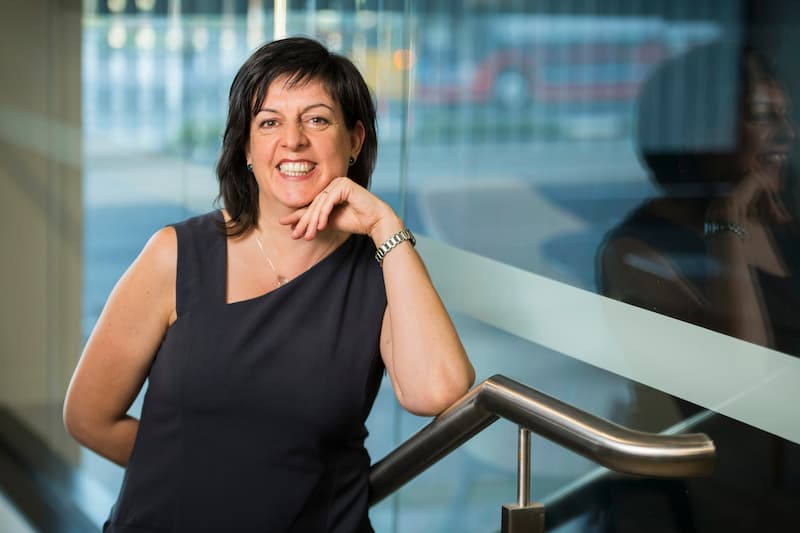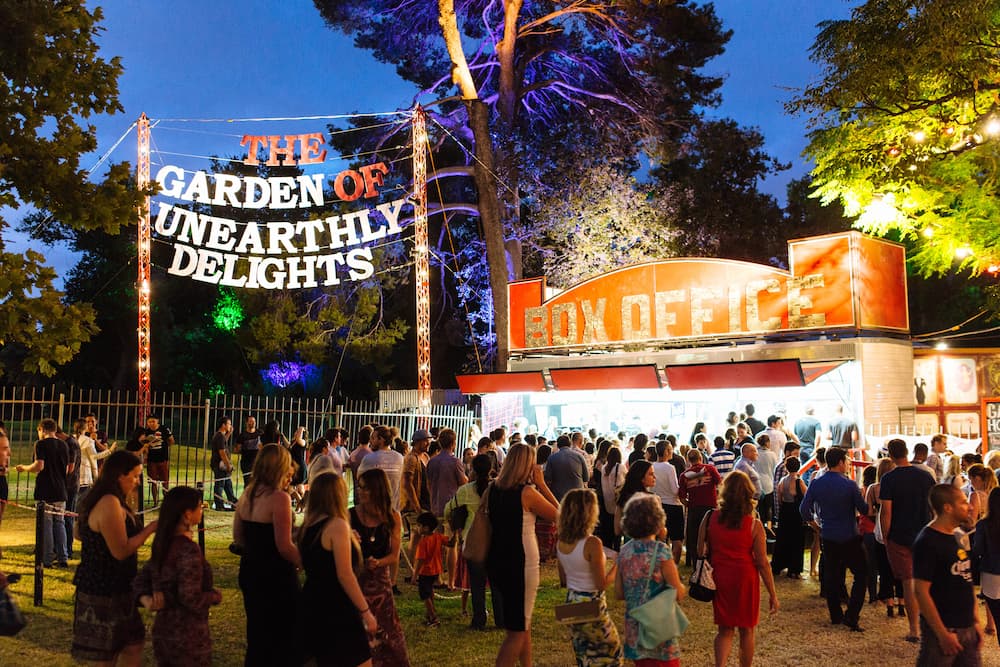01 April 2018

Christie Anthoney
Graduate Diploma in Management (Arts)
Chief Executive Officer, Festivals Adelaide
Encouraging the public to take a walk on the wild side is just your typical day in the office for Christie Anthoney. Allowing the Scottish Sceptic Society to let audience members walk across hot coals at the Edinburgh Science Festival is not the only time that Christie has played with fire in a global career in the arts and festivals sector spanning two decades. She also supported famed French fire alchemists Cie Carabosse to bring their first fire installation to Australia at WOMADelaide over a decade ago.
The initiative shown by Christie in convincing the owner of the Famous Spiegeltent to bring the 1920s European ‘tent of mirrors’ to Adelaide in 2000 and land it in Rundle Park, is now the stuff of legend. Ultimately this bold act gave birth to The Garden of Unearthly Delights, a vibrant hub of performance venues, stalls, bars, sideshows and carnival rides, which regularly attracts around 800,000 people through its gates during Adelaide’s Fringe Festival, a time locals affectionately call ‘Mad March’. Christie counts this as one of her proudest professional achievements.

This risky business paid dividends, with Christie appointed Director of the Adelaide Fringe from 2004-2010. Her leadership drove growth in hub venues, developed an international marketplace –the Honeypot program, and launched the now famous artists’ bar, The Fringe Club.
In her current role as Chief Executive Officer, Festivals Adelaide, Christie continues to turn up the heat, helping create the conditions for unique and thrilling work to be presented to audiences.
“The arts are a very satisfying sector to work in. Festivals even more so. The beauty of the festival sector is that it’s such a great blend, all art forms, all demographics, commercial work, subsidised work, unusual, formal, even proper work,” says Christie.
“They have such intensity. Everyone pulls together to work on delivering the very best festival they can, and then it’s over. You can’t go back and change anything. I love that.”
Now at the helm of Festivals Adelaide, an alliance of 11 South Australian arts and cultural festivals that generate over $260 million of economic activity for the state annually, Christie provides leadership in a sector that has been growing at a rate of 10% per annum for the last ten years, and supports 850 jobs (full-time equivalent). Festivals Adelaide also manages a vast volunteer network – a ‘cultural army’ of 1,500 people, with the aim of enhancing the festival experience and enriching the lives of its volunteers - many of whom are recent retirees.
“Adelaide is one great global marketplace for entertainment, ideas and talent. The shareholders vote with their wallets, and success goes on tour around the world. You can really make a large splash in Adelaide and have a huge amount of international success.
“Adelaide is already the second largest festival city in the world and certainly the largest in Australia. South Australia currently sells 50.3% of the nation’s ticket sales for festivals. There is no sign of this changing in future years. That means by 2050 we will have tripled the size of the sector.”
At this rate, Christie believes that within thirty years, Adelaide will be the leading festival city in the world, and will be known for its openness to experimentation and innovation.
“South Australian’s are already extremely hungry for new ideas as evidenced by their extraordinary attendance of festival shows – particularly new work that has never been seen before. Knowing the power of festivals to mobilise, to connect, and encourage experimentation, Festivals Adelaide seeks to foster these conditions so that Adelaide can become the most joined up creative community, and the best place to trial new ideas. We believe the ways in which people behave differently during festivals is transferrable to other sectors and will positively influence the brand and business of the State.”
An experienced arts leader, she credits the Graduate Diploma in Management (Arts) with providing the foundation for her career.
“This degree was fundamental and really is the only course in South Australia that is dealing with management and the arts. Everyone I knew in the industry had it, and I had to have it. The fabulous networks that I made, not to mention accounting and business skills, have been hugely helpful.”
The importance of flexibility, risk-taking, and seeing things from other perspectives were all key lessons Christie took from her studies, but she confesses that not everything can be taught.
“Some of it is X factor – that delicate balancing act of intuiting when to hold on to opportunities, and when to let them go. Being comfortable with the unknown and understanding the consequence of timing and decisions is highly desirable. People who show calm confidence in working under pressure will thrive in the festival sector.
“This is a transient world. There is plenty of work and it’s growing – but it’s global. The investment in travel is necessary and can ultimately lead to being in one place and having a successful leadership role, but most people start out piecing together work on a contractual basis.
“The arts and cultural sector is hugely rewarding, but very demanding and often volatile. Because careers in the arts rely on short-term contracts you must have a confidence and optimism about the future and your skills. Displaying initiative and working with the group to see the big picture, while not missing the detail is important, as is working across multiple tasks.”
Christie has set for herself a goal of achieving 99% arts engagement and participation from South Australians, an ambitious, but not impossible target, given the growth performance of the sector and the receptiveness of the population. Reaching this target could have benefits beyond measure, Christie shares.
“That moment when your intellect brushes up against that of a stranger’s, as you have an ‘aha’ moment or share something in an audience together. These things are important, they make us feel human, and wanting to feel human is indeed a growing trend.”
Christie Anthoney is on the Advisory Board for MOD @ UniSA – Australia's leading future-focused museum, provoking new ideas at the intersection of science, art and innovation.





